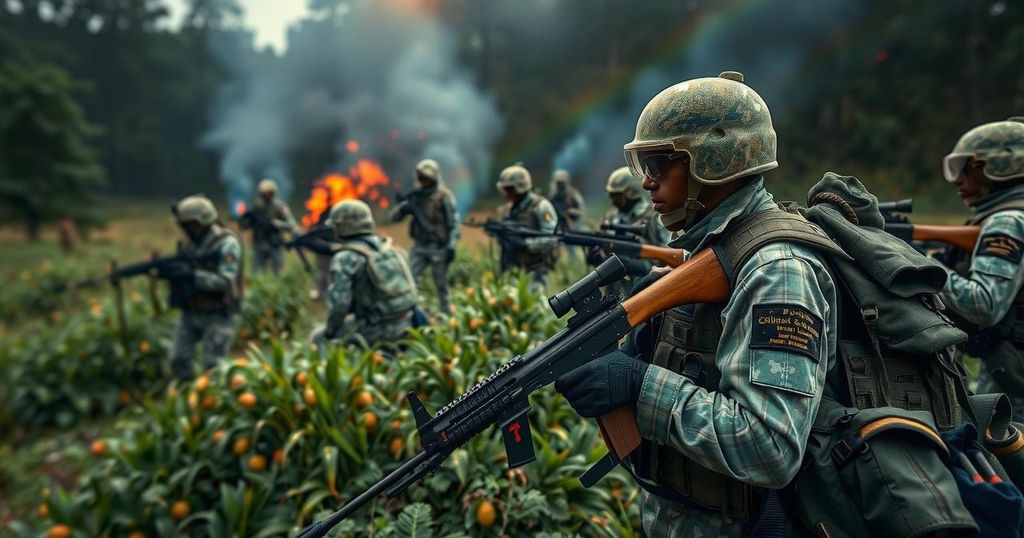HRW Reports Civilian Atrocities by Rwandan Forces and M23 Rebels in DRC

Human Rights Watch has published a report accusing Rwandan forces and the M23 rebel group of committing grave atrocities against civilians in eastern DRC, including indiscriminate attacks and sexual violence, exacerbating an already dire humanitarian crisis. The report emphasizes the need for accountability, investigations, and humanitarian assistance for affected populations.
Human Rights Watch (HRW) has released a damning report highlighting severe civilian atrocities in eastern Democratic Republic of the Congo (DRC) attributed to Rwandan forces and the M23 rebel group amid escalated military confrontations. As these armed entities edge closer to the town of Sake, local residents—including over half a million displaced individuals—face an increasing risk of violence and humanitarian crises. The M23, a Tutsi-led insurgent group supported by Rwanda, has been implicated in numerous criminal actions against civilians since its resurgence in 2021, including indiscriminate attacks, sexual violence, and the forced conscription of child soldiers. The situation within North Kivu, where conflicts are particularly intense, has deteriorated alarmingly. Displacement camps around Goma are now hotspots for violence. For instance, the Shabindu-Kashaka displacement site was struck by rockets fired by Rwandan military forces and M23, resulting in casualties and extensive property damage. Particularly harrowing was the recent attack on May 3, which claimed at least 17 civilian lives, including 15 children, further illustrating the impending humanitarian disaster. HRW’s report sheds light on dire conditions in the Kanyaruchinya camp, where unlawful detentions and extortion by Wazalendo fighters are reported. Detainees are held in makeshift facilities known as “kiboro” and suffer from systemic violence and abuse. Survivors have reported rampant sexual violence, noting that many attackers were dressed in military uniforms, and alarming trends indicate between 50 to 100 reported cases weekly within various camps, reinforcing the urgent need for protection. These actions may represent grave violations of international humanitarian law, notably the Fourth Geneva Convention, aimed at safeguarding civilian populations during conflict. Furthermore, unlawful detentions and extortion could fall under war crimes as delineated by the Rome Statute of the International Criminal Court. HRW has urged both Congolese and Rwandan governments to conduct thorough investigations and prosecute war crimes, especially those related to sexual violence, adhering to the principle of command responsibility. The organization also advocates for holistic humanitarian assistance for affected civilians, encompassing legal, social, and medical support for sexual violence survivors. In conclusion, Human Rights Watch has called on both nations to endorse the 2022 Political Declaration aimed at enhancing civilian protection from the adverse effects of explosive weapon usage in populated areas. Additionally, HRW encourages international organizations such as the UN and EU to monitor military support to both parties to ensure compliance with human rights standards, preventing future abuses.
The Democratic Republic of the Congo has faced long-standing conflict and unrest, exacerbated by rebel insurgencies and regional tensions. The M23 rebel group, predominantly composed of Tutsi members and receiving alleged backing from Rwanda, reignited its violent campaign in 2021. This resurgence has led to widespread allegations of human rights violations against civilians, including sexual violence and forced conscription of minors. The ongoing military confrontations have resulted in significant displacement, further straining humanitarian conditions in an already fragile region.
Human Rights Watch’s recent findings underscore an urgent need for accountability and humanitarian assistance in eastern DRC, where civilians face severe risks due to the ongoing conflict involving Rwandan forces and M23 rebels. The report illustrates the systemic nature of human rights abuses and calls for immediate investigations and protective measures for vulnerable populations. Continued international vigilance and support are essential to prevent further atrocities and uphold humanitarian law.
Original Source: www.jurist.org








